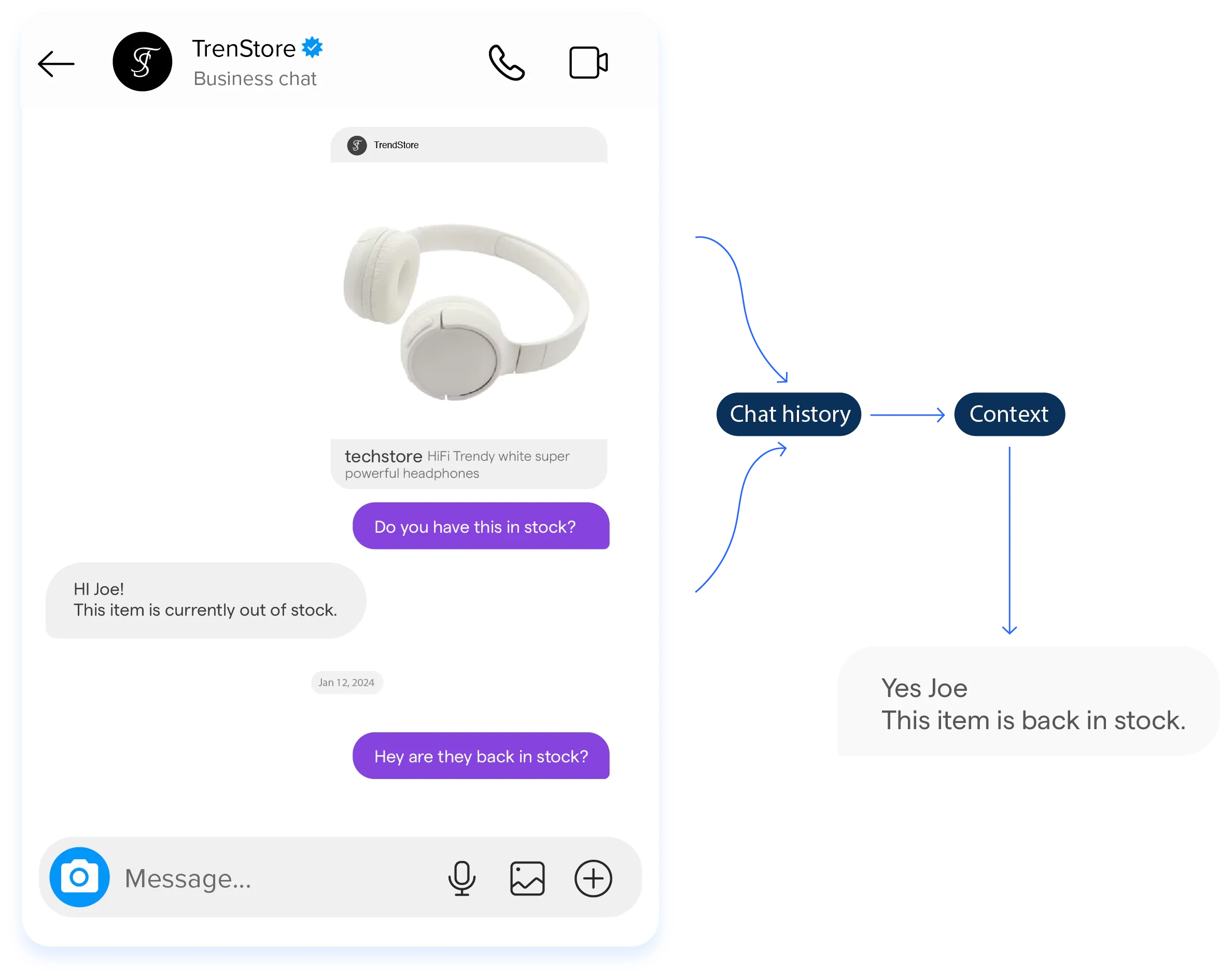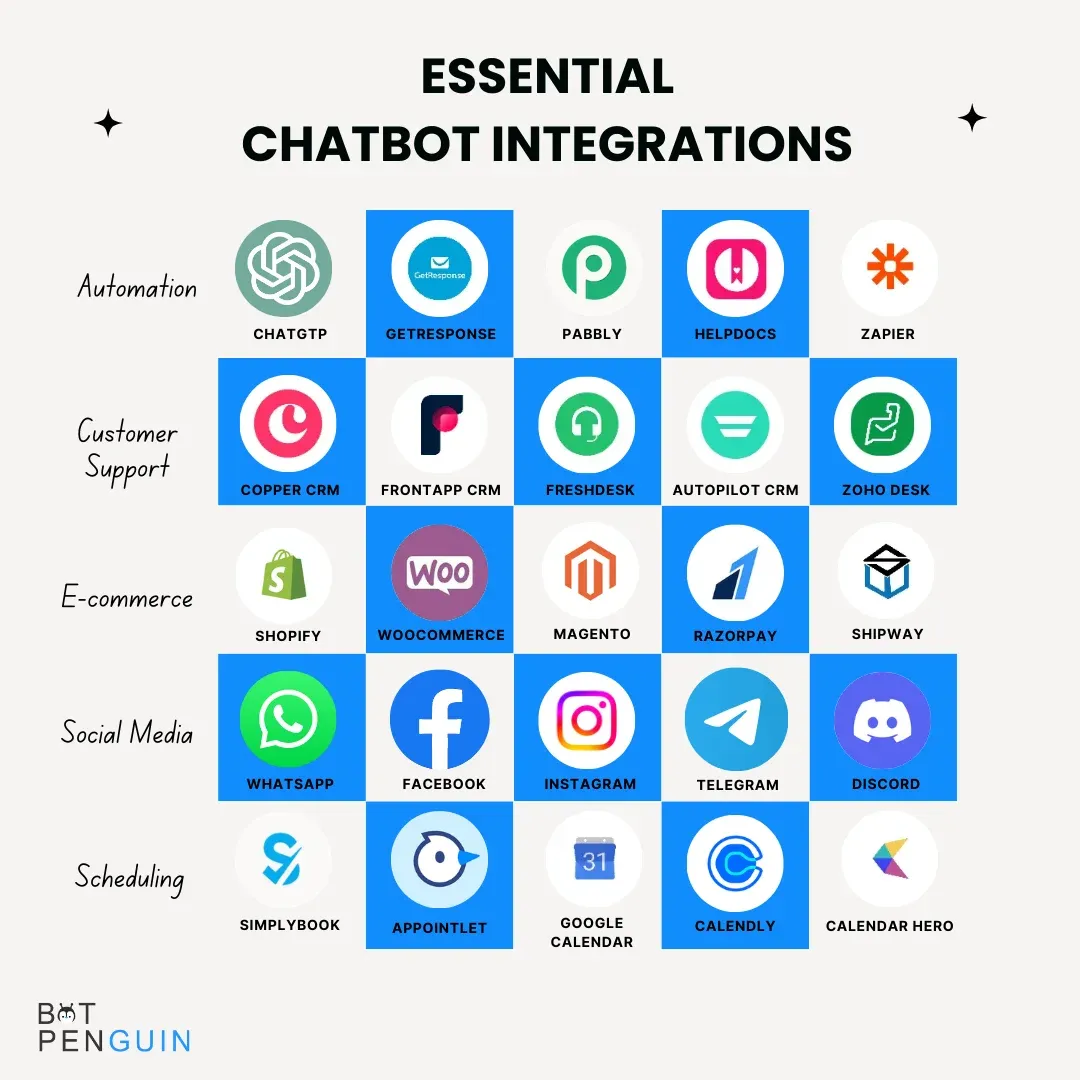Artificial intelligence is exploding, with new software, interfaces, and use cases being developed daily. However, conversational AI has had a different impact.
These tools are already everywhere, from AI-powered chatbots to voice assistants embedded into our phones. The application of this transformative technology is still expanding rapidly, with enormous potential to transform e-commerce as we know it radically.
According to Gartner, chatbots will be the primary customer service tool for 25% of businesses by 2027.
What is fueling the e-commerce chatbot revolution, estimated to reach $1.25 billion by 2025? The credit goes to 24x7 customer service, automation of routine tasks, instant engagement, and multi-channel interactions at scale are all possible.
Chatbots help retailers save time and money by connecting them with customers anytime.
This guide will teach you everything you need about conversational AI, how it works, and what your company can do to embrace the new frontier of AI-powered e-commerce.
How is Conversational AI Used in eCommerce?

In eCommerce, conversational AI chatbots use advanced technology to chat with customers just like a real person would. By analyzing data and understanding preferences, these virtual assistants make shopping easier and more enjoyable, boosting sales and keeping customers happy.
Application of Conversational AI Chatbots in eCommerce
Chatbots are AI-powered conversational agents that can interact with users in a human-like manner. They are programmed to understand natural language and provide relevant responses to user queries.
- Virtual Shopping Assistants: These AI-powered assistants help customers make informed purchasing decisions by analyzing their preferences, purchase history, and browsing behavior.

- Personalized Recommendations: Through advanced algorithms, conversational AI offers tailored product recommendations and suggestions based on individual customer preferences.
- Enhanced Shopping Experience: By understanding customer needs, conversational AI improves the overall shopping journey, leading to increased customer satisfaction and loyalty.
- Increased Conversions: Personalized recommendations and guided assistance increase conversion rates as customers find products that align with their interests and needs.

- 24/7 Customer Support: Chatbots powered by conversational AI provide round-the-clock assistance, resolve queries, and address concerns promptly, even outside of business hours.
- Order Tracking and Updates: Conversational AI can also provide real-time order tracking and updates, keeping customers informed about the status of their purchases.
By leveraging conversational AI chatbots, eCommerce businesses can create more engaging, personalized, and efficient shopping experiences for their customers, ultimately driving growth and success.
Pros and Cons of Chatbots in eCommerce
Chatbots are not all perfect; they have their merits and drawbacks. Let’s have a deeper look.
Pros
- 24/7 availability: Chatbots can provide round-the-clock support, ensuring customers can access assistance anytime.
- Efficiency and scalability: Chatbots can handle multiple conversations simultaneously, allowing businesses to scale their customer support without increasing human resources.
- Improved response times: Chatbots provide instant responses, reducing customer wait times and enhancing overall customer experience.
- Cost savings: By automating customer interactions, chatbots can reduce the need for human agents, leading to cost savings for businesses.
Cons
- Limited understanding: Chatbots may need help understanding complex or nuanced customer queries, leading to inaccurate or unhelpful responses.
- Lack of empathy: Chatbots lack human touch and empathy, which can be important in certain customer support scenarios.
- Complexity of implementation: Developing and training chatbots to meet specific business requirements can be a complex process requiring AI and natural language processing expertise.
- Maintenance and updates: Chatbots require regular updates and improvements to stay relevant and effective, which can involve additional resources and costs.
And beginning with Conversational AI for your eCommerce business isn't that tough. Meet BotPenguin- the home of AI chatbot solutions.
With BotPenguin you can easily train your chatbot on custom data, paint them with your logo and branding, and offer human-like conversational support to your customers.
And that's not it. BotPenguin makes sure that you reach your customers where they are by offering AI chatbots for multiple platforms, thus making omnichannel support look easy:
- WhatsApp Chatbot
- Facebook Chatbot
- WordPress Chatbot
- Telegram Chatbot
- Website Chatbot
- Squarespace Chatbot
- Woocommerce Chatbot
- Instagram Chatbot
Implementing conversational AI in eCommerce
Implementing conversational AI in eCommerce can significantly enhance customer interactions and improve the shopping experience.
Conversational AI, or chatbots or virtual assistants, utilize artificial intelligence to engage in natural language conversations with customers.
Here are some key aspects to consider when implementing conversational AI in eCommerce:
Customer Support and Assistance
- Chatbots can provide 24/7 customer support, instantly responding to customer queries and providing relevant information about products, orders, and policies.
- They can handle multiple customer inquiries simultaneously, reducing response time and improving customer satisfaction.
- Chatbots can assist customers in finding specific products, offering personalized recommendations based on their preferences and browsing history.

Order and Shipping Updates

- Conversational AI technology enables automated updates on order statuses, tracking information, and estimated delivery times.
- Customers can easily obtain real-time information about their orders, reducing the need for manual tracking and improving transparency.
Suggested Reading:
Personalized Shopping Experience
- AI-powered chatbots can analyze customer data and behavior to provide personalized recommendations and tailored offers.
- Chatbots can suggest relevant products, promotions, and upselling opportunities by understanding customer preferences, improving customer engagement and conversion rates.
Seamless Integration with Existing Platforms

- Conversational AI can be easily integrated into eCommerce platforms, including websites, mobile apps, and social media channels.
- Integration allows chatbots to interact with customers across different touchpoints, providing a consistent and seamless shopping experience.
Natural Language Understanding and Context
- Advanced Natural Language Processing (NLP) capabilities of chatbots enable them to understand and respond to customer queries more humanistically.
- Chatbots can accurately interpret customer intent, context, and sentiment, ensuring meaningful and context-aware responses.
Continuous Improvement through Machine Learning
- Chatbots can be trained using machine learning algorithms to constantly improve their understanding and responses.
- By analyzing customer interactions and feedback, chatbots can learn from past conversations and adapt to provide more accurate and relevant assistance.
- When implementing conversational AI in eCommerce, it is crucial to consider factors such as the complexity of customer inquiries, language variations, and the need for human intervention in certain scenarios. This can help strike the right balance between automation and human support, ensuring a seamless and efficient shopping experience for customers.
Suggested Reading:
Future of Conversational AI in eCommerce
The future of conversational AI in eCommerce is bright and holds immense potential for transforming how customers interact with online retailers. Here are key aspects to consider when envisioning the future of conversational AI in eCommerce:
Emerging Trends and Advancements in Conversational AI
- Natural Language Understanding and Contextual Conversations: Conversational AI is becoming more advanced in understanding natural language and context, allowing for more seamless and human-like interactions.
- Multilingual Support: conversational AI is evolving to support multiple languages, enabling retailers to cater to a global customer base and expand their reach.
- Voice-Based Commerce: Voice assistants and voice-activated devices are gaining popularity, opening up new opportunities for voice-based transactions and interactions.
- Emotional Intelligence: AI advancements enable chatbots to understand and respond to emotions, creating more empathetic and personalized interactions.
Predictions for the Future of eCommerce with AI-Driven Conversations:
- Improved Customer Experience: conversational AI will continue to elevate the customer experience by providing instant and personalized assistance throughout the customer journey.
- Elevated Personalization: AI-driven interactions empower retailers to deliver customized recommendations, promotions, and loyalty initiatives tailored to individual customer preferences and behaviors.
- Boosted Sales and Conversions: Intelligent chatbots offering instant product details and suggestions will encourage customers to make well-informed buying choices, resulting in higher sales and conversion rates.
- Effortless Cross-Channel Shopping: AI-powered conversations allow customers to initiate a discussion on one platform, like a website, and smoothly switch to another, such as a mobile app, without losing context. This ensures a unified and consistent shopping journey.
Implications and Challenges to Consider
- Data Privacy and Security: As conversational AI relies on collecting and analyzing customer data, ensuring robust privacy and security measures will be crucial to earning and maintaining customer trust.
- Integration with Existing Systems: Integrating conversational AI into existing eCommerce platforms may present technical and logistical challenges, requiring seamless integration to provide a cohesive user experience.
- Human Emulation and Transparency: As chatbots become more advanced, it will be important to clearly distinguish between human and AI interactions to maintain transparency and manage customer expectations.
- Ethical Considerations: As AI-driven conversations become more sophisticated, businesses must be mindful of ethical guidelines and ensure they do not engage in deceptive or manipulative practices.
Conclusion
AI chatbots have emerged as indispensable tools for businesses to improve operational efficiency, increase customer happiness, and meet growth goals across various industries and use cases.
Conversational AI is on the verge of becoming the most revolutionary e-commerce technology.
These clever bots provide enterprises with previously imagined capabilities by automating monotonous processes and optimizing resources.
BotPenguin's AI chatbot, in particular, demonstrates how far technology has progressed by allowing round-the-clock consumer interaction, providing personalized recommendations, assuring GDPR compliance, and qualifying leads for more concentrated sales efforts.
It will deliver cutting-edge tracking tools to your clients and catapult your online e-commerce firm to new heights of success.
Suggested Reading:
Frequently Asked Questions (FAQs)
What is conversational AI, and how does it work in eCommerce?
Conversation AI uses machine learning and natural language processing to develop intelligent chatbots and voice assistants to engage in human-like conversations with customers. In eCommerce, chatbots can provide personalized guidance, answer product questions, and facilitate transactions.
What benefits can conversational AI bring to eCommerce businesses?
Conversational AI can enhance the customer experience by providing real-time and personalized assistance, improving engagement, increasing sales and conversion rates, and providing a seamless cross-channel shopping experience.
What questions can chatbots and voice assistants answer in eCommerce?
Chatbots and voice assistants can answer various questions within an eCommerce context, such as product features and specifications, shipping and returns information, and order tracking details.
How can businesses ensure customer privacy and security when using conversational AI?
To ensure customer privacy and security while using conversational AI, businesses can encrypt customer data, limit access to sensitive information, and implement robust security measures to protect against data breaches and malicious attacks.
What challenges may arise when integrating conversational AI into existing eCommerce platforms?
Integrating conversational AI into existing eCommerce platforms can present technical and logistical challenges. These include ensuring seamless integration with existing systems, maintaining the consistency of user experiences across channels, and avoiding disruption to existing workflows.
What ethical considerations should businesses consider when using conversational AI in eCommerce?
Ethical considerations when using conversational AI in eCommerce include ensuring transparency about using chatbots and voice assistants, avoiding manipulative or deceptive practices, and adhering to industry-established ethical guidelines and best practices.



